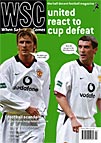 After initial success in the Premiership, Ipswich Town now find themselves in financial turmoil. Csaba Abrahall documents their fall from grace
After initial success in the Premiership, Ipswich Town now find themselves in financial turmoil. Csaba Abrahall documents their fall from grace
“So much of football is about short-term glory which leads so often to boom and bust. We’re not about that.” So said David Sheepshanks when Gavin Barber and I interviewed him for WSC 172 on the day Ipswich secured European qualification in 2001. This kind of level-headed approach had been a feature of his chairmanship and while he continued to adopt it, the club appeared to be in safe hands. Yet today it is in administration, with debts spiralling and the team a long way short of delivering financial salvation in the form of a return to the Premiership. What on earth went wrong?
Ipswich committed a great deal of money to players, wages and infrastructure in the 12 months following European qualification, apparently abandoning the cautiousness that Sheepshanks had previously held dear. Though the new signings themselves were by no means a total disaster, their introduction unsettled the balance of the team and relegation ensued. The club was left with the task of financing a large, well paid squad and developing stadium on massively reduced income and found it impossible. The price of relegation, according to Sheepshanks, was “financial ruin”.
Many put this down to careless over-expenditure, suspecting that the board failed to entertain the possibility of going down and based their decisions on the assumption that the club would have a Premiership future. Sheepshanks vehemently denies this. The net £8 million spent on players was not excessive in Premiership terms and, though the manager and some players received improved contracts, Town’s wage bill was still only 14th highest in the top flight. With the ground improvements financed by a secured bond paid off in manageable instalments, not only were Ipswich able to afford this outlay, they could return an operating profit while still in the Premiership.
Obviously, relegation changes everything. Ipswich knew that and had in place a contingency plan. The problems began when that plan – the generation of revenue through selling players – failed.
The sales of Titus Bramble, Marcus Stewart and Jamie Clapham brought in about £7 million, but more is needed. Unfortunately for the board, Matt Holland, Hermann Hreidarsson, Marcus Bent and Martijn Reuser all declined moves back to the Premiership, while Newcastle’s recent £3 million offer to the administrators for Darren Bent, Darren Ambrose and the untried Matt Bloomfield was rejected. It will benefit neither the club nor its creditors to let its prize assets depart at knockdown prices.
Had most of those deals been completed, Town would have few problems at present – apart from possessing a poor team. It hardly seems sensible, though, to rely so heavily on something as unpredictable as the transfer of footballers. Other unforeseen factors have contributed to Ipswich’s fiscal meltdown – the familiar excuses of the collapse of ITV Digital and the introduction of the transfer window have made a pre- dictable appearance – but Town may regret the failure to form an effective Plan B.
Even so, Sheepshanks insists that the current problems have arisen largely due to circumstances beyond his control – and the similar crises at Leicester and Derby support his view that relegation last season would have devastated any club. However, the dramatic increase in the club’s outgoings that began in the summer of 2001 is clearly at the root of its current plight, and so the argument will always return to the wisdom of those investments.
Few saw the need for a major overhaul of a successful team. Perhaps Sheepshanks’ biggest mistake was to trust George Burley’s judgment, but he had every reason to. Burley had achieved much at the club and was Manager of the Year. It was not the chairman’s style of leadership to question the manager’s decisions. He believed the deals were affordable and he trusted Burley to bring in the right players. It is unfortunate for them both that they were not a success.
If the creditors refuse to accept the administration document, Sheepshanks will probably be forced to leave the board. He may then be left to reflect on some-thing else he told WSC in 2001: “High-quality management comes ahead of money”. That was true at Portman Road for a while, but money soon caught up.
From WSC 194 April 2003. What was happening this month